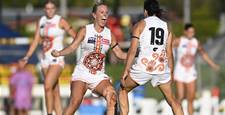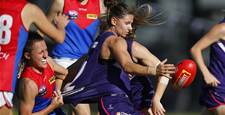In knocking out Brazil and reaching the quarter finals of the expanded FIFA Women's World Cup, the Matildas have created another slice of Australian football history.
In knocking out Brazil and reaching the quarter finals of the expanded FIFA Women's World Cup, the Matildas have created another slice of Australian football history.
As the team prepares to meet defending World Champions and AFC compatriots Japan, we take a look back at some of the lessons learned from the Matildas first four matches.
A team that defends together wins together
It has already been spoken about in previous articles but the defensive performance of the Matildas again needs to be highlighted, especially for a program that has had much talked about defensive frailties in the past 5 - 8 years.
 USA shots on goal
USA shots on goalThe two clean sheets in this tournament (against Nigeria and Brazil) are the first in Australia's senior World Cup history (men's or women's).
As a unit, the back four of Caitlin Foord, Laura Alleway, Alanna Kennedy and Stephanie Catley have been excellent. Positionally the two centre backs Alleway and Kennedy have displayed good decision making, body positioning, tackling and, when required, recovery.
At 20, Kennedy should be in consideration for the Best Young Player for the tournament. Her assured performances, alongside Alleway, have seen them corral some of the tournament's best strikers.
The fullbacks Foord and Catley are one of the best pairings in the competition. Defensively the pacy duo have hardly put a foot wrong while offensively they have provided plenty of support for the midfield and attack.
 Nigeria shots on goal
Nigeria shots on goalThen there is Lydia Williams.
Her performances this tournament have displayed why the Matildas coaching and medical staff were so anxious to see the 2x W-League Goalkeeper of the Year recover in time from an ACL injury.
At the top of her game Williams is one of the top 5 goalkeepers in the world with her strong positioning, reach and quick-fire reflexes. Goalkeepers may not win matches but they can stop you from losing them as Williams did on several occasions against Formiga and Marta.
However, as Alen Stajcic stated in a pre-tournament interview with The Women's Game:
"Defending is not just about defenders; it’s about the whole team."
"It is not about the back four or the goalkeeper, it’s about all 11 players and what they do as a unit. We have worked very hard on that but defending is one part of the game."
 Sweden shots on goal
Sweden shots on goalThe press Australia has employed this tournament has resulted in added protection for the back four with teams finding it difficult to get in behind the defence and get shots on goal from the 18 yard area.
While Australia's overall attacking performance against the USA was promising, defensively, as the game wore on, the Matildas were unable to maintain the aggressive press they had employed in the opening 60 minutes.
As the tournament has progressed it has become more considered, co-ordinated and effective to the point where during the Round of 16 match Brazil were frustrated into only taking shots from distance.
Lisa De Vanna and Sam Kerr are examples of the buy in of the team defence with both players tracking dutifully, even down to Australia's defensive touchline.
 Brazil shots on goal
Brazil shots on goalAlen Stajcic and the coaching staff
The Matildas coaching staff has to be commended for getting their tactics close to spot on for all three matches.
That is not to say there haven't been mistakes. In hind sight the gung-ho approach against the United States early in the match cost them the match with the team unable to keep up the intensity for the full 90 minutes.
However, with each match there have been micro adjustments to suit the opposition, learn from the mistakes made in the previous match while still largely playing Australia's own game.
Players have spoken about how well prepared they have been for each opposition with each part of the machine well aware of their role and how to execute the game plan. That comes down to how well the coaching staff have researched, scouted and equipped the players.
Stajcic has also had strong in game management with many of the substitutions having a positive impact on the game.
Competition toll
With four matches, including three against top 10 nations, and quarter final against an opponent who displayed their championship credentials in the Round of 16, the issue for the Matildas is now player management and recovery.
The Round of 16 match against Brazil saw some glimpses of fatigue setting into players like Sam Kerr, Elise Kellond-Knight and Emily van Egmond who have played close to 360 minutes of football.
Australia has two days extra rest on Japan but they have also had to cross a number of timezones to Moncton and back. Add to the tough nature of their path to the quarter finals, the freshness and the depth of the squad is sure to be tested against a team they know will have them chasing.
Related Articles

'Timing not right': Montemurro's verdict on Matildas vacancy
.jpg&h=172&w=306&c=1&s=1)
Matildas star ready for epic return after 'really difficult' journey













